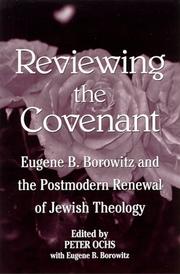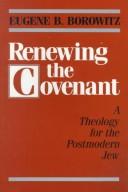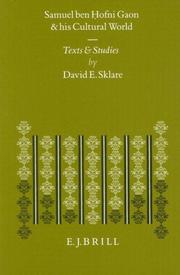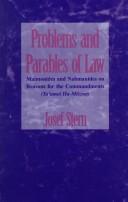| Listing 1 - 9 of 9 |
Sort by
|
Book
ISBN: 1951498690 1951498038 Year: 2020 Publisher: Atlanta, Georgia : Scholars Press,
Abstract | Keywords | Export | Availability | Bookmark
 Loading...
Loading...Choose an application
- Reference Manager
- EndNote
- RefWorks (Direct export to RefWorks)
Commandments (Judaism) --- Good works (Judaism) --- Mitsvah --- Mitsvot --- Mitzvah --- Mitzvot --- Precepts (Judaism) --- Jewish law --- Jewish way of life --- Judaism --- Customs and practices
Book
ISBN: 1618111000 9781618111005 9781934843048 1934843040 9781934843536 1934843539 Year: 2008 Publisher: Boston, MA
Abstract | Keywords | Export | Availability | Bookmark
 Loading...
Loading...Choose an application
- Reference Manager
- EndNote
- RefWorks (Direct export to RefWorks)
This classic work by early-20th-century Jewish humanist and scholar Isaac Heinemann surveys the crucial phases of Jewish thought concerning correct conduct as codified in the commandments. Heinemann provides his own systematic insights about the intellectual, emotional, pedagogical, and pragmatic reasoning advanced by the major Jewish thinkers. This volume covers Jewish thinkers from the Bible, rabbis and Hellenistic philosophers through the Middle Ages and the Renaissance, including Saadiah, Halevi, Maimonides, Albo, and many others. Heinemann addresses such questions as: "What were the Biblical, rabbinic, medieval, and modern rationales offered for the commandments in the course of Jewish thought?"
Commandments (Judaism) --- Good works (Judaism) --- Mitsvah --- Mitsvot --- Mitzvah --- Mitzvot --- Precepts (Judaism) --- Jewish law --- Jewish way of life --- Judaism --- Customs and practices

ISBN: 0791492796 0585315906 9780585315904 9780791492796 0791445348 9780791445341 9780791445334 079144533X Year: 2000 Publisher: Albany : ©2000 State University of New York Press,
Abstract | Keywords | Export | Availability | Bookmark
 Loading...
Loading...Choose an application
- Reference Manager
- EndNote
- RefWorks (Direct export to RefWorks)
In Reviewing the Covenant, six Jewish philosophers—and one Christian colleague—respond to the work of the renowned Jewish theologian Eugene B. Borowitz, one of the leading figures in the movement of "postmodern" Jewish philosophy and theology. The title recalls Borowitz's earlier book, Renewing the Covenant: A Theology for the Postmodern Jew, in which he lent this movement a theological agenda, and the essays in this book respond to Borowitz's call: to revitalize contemporary Judaism by renewing the covenant that binds modern Jews to re-live and re-interpret the traditions of Judaism's past.Together with the introductory and responsive essays by Peter Ochs and Borowitz himself, the essays offer a community of dialogue, an attempt to reason-out how Jewish faith is possible after the Holocaust and how reason itself is possible after the failings of the great "-isms" of the modern world. This dialogue is conducted under the banner of "postmodern Judaism," a daunting term that by the end of the book receives a surprisingly direct meaning, namely, the condition of disillusionment and loss out of which Jews can and must find a third way out of the modern impasse between arrogant rationalism and arrogant religion. Representing a major intellectual response to the leading theologian of liberal Judaism, the book provides a significant indication of future directions in Jewish religious thought.Contributors include Eugene B. Borowitz, Yudit Kornberg Greenberg, Susan Handelman, David Novak, Peter Ochs, Thomas W. Ogletree, Norbert M. Samuelson, and Edith Wyschogrod.
Postmodernism --- Covenants --- Commandments (Judaism) --- Judaism --- Agreements --- Good works (Judaism) --- Mitsvah --- Mitsvot --- Mitzvah --- Mitzvot --- Precepts (Judaism) --- Jewish law --- Jewish way of life --- Religious aspects --- Judaism. --- History of doctrines --- Customs and practices --- Borowitz, Eugene B.
Book
ISBN: 1280491132 9786613586360 1611682320 9781611682328 9781611682304 1611682304 9781611682311 1611682312 Year: 2012 Publisher: Waltham, Mass. Brandeis University Press
Abstract | Keywords | Export | Availability | Bookmark
 Loading...
Loading...Choose an application
- Reference Manager
- EndNote
- RefWorks (Direct export to RefWorks)
Offers a roadmap for revitalizing the connection between the Jewish people and the Jewish past
Repentance --- Holocaust, Jewish (1939-1945) --- Love --- Commandments (Judaism) --- Memory --- Judaism --- Good works (Judaism) --- Mitsvah --- Mitsvot --- Mitzvah --- Mitzvot --- Precepts (Judaism) --- Jewish law --- Jewish way of life --- Jews --- Religions --- Semites --- Judaism. --- Influence. --- Religious aspects --- History --- Philosophy. --- Customs and practices --- Religion
Book
ISBN: 9789004366879 9004366873 9789004366886 9004366881 Year: 2018 Volume: 105 Publisher: Leiden Brill
Abstract | Keywords | Export | Availability | Bookmark
 Loading...
Loading...Choose an application
- Reference Manager
- EndNote
- RefWorks (Direct export to RefWorks)
"Kengo Akiyama traces the development of the mainstay of early Jewish and Christian ethics: "Love your neighbour." Akiyama examines several Second Temple Jewish texts in great detail and demonstrates a diverse range of uses and applications that opposes a simplistic and evolutionary trajectory often associated with the development of the "greatest commandment" tradition. The monograph presents surprisingly complex interpretative developments in Second Temple Judaism uncovering just how early interpreters grappled with the questions of what it means to love and who should be considered as their neighbour."--Page 4 of cover.
Commandments (Judaism) --- Neighborliness --- 222.3 --- 222.3 Exodus. Leviticus. Numeri --- 222.3 L'Exode. Le Lévitique. Les Nombres --- Exodus. Leviticus. Numeri --- L'Exode. Le Lévitique. Les Nombres --- Good works (Judaism) --- Mitsvah --- Mitsvot --- Mitzvah --- Mitzvot --- Precepts (Judaism) --- Jewish law --- Jewish way of life --- Judaism --- Religious aspects&delete& --- Customs and practices --- Bible. --- Criticism, interpretation, etc. --- Friendship --- Religious aspects --- Judaism.

ISBN: 0827604009 Year: 1991 Publisher: New York (N.Y.): Jewish publication society
Abstract | Keywords | Export | Availability | Bookmark
 Loading...
Loading...Choose an application
- Reference Manager
- EndNote
- RefWorks (Direct export to RefWorks)
Judaism --- Commandments (Judaism) --- Covenants --- Judaïsme --- Commandements (Judaïsme) --- Alliances (Religion) --- Religious aspects --- Histoire --- 296*63 --- -Covenants --- -Judaism --- -Jews --- Religions --- Semites --- Jews --- Agreements --- Good works (Judaism) --- Mitsvah --- Mitsvot --- Mitzvah --- Mitzvot --- Precepts (Judaism) --- Jewish law --- Jewish way of life --- Joodse theologie en filosofie--in de moderne en hedendaagse tijd --- History of doctrines --- -Religious aspects --- -History of doctrines --- -Religion --- Religion --- Customs and practices --- -Joodse theologie en filosofie--in de moderne en hedendaagse tijd --- -296*63 --- 296*63 Joodse theologie en filosofie--in de moderne en hedendaagse tijd --- Judaïsme --- Commandements (Judaïsme)

ISBN: 9004103023 9004494820 Year: 1996 Volume: 18 Publisher: Leiden Brill
Abstract | Keywords | Export | Availability | Bookmark
 Loading...
Loading...Choose an application
- Reference Manager
- EndNote
- RefWorks (Direct export to RefWorks)
Rabbis --- Jewish scholars --- Jews --- Commandments (Judaism) --- Rabbins --- Savants juifs --- Juifs --- Commandements (Judaïsme) --- Biography --- Intellectual life --- Biographies --- Biographie --- Vie intellectuelle --- Samuel ben Hophni, --- 296*62 --- 1 <=924> SAMUEL BEN HOFNI GAON --- -Jews --- -Rabbis --- -Jewish rabbis --- Clergy --- Judaism --- Hebrews --- Israelites --- Jewish people --- Jewry --- Judaic people --- Judaists --- Ethnology --- Religious adherents --- Semites --- Scholars, Jewish --- Scholars --- Good works (Judaism) --- Mitsvah --- Mitsvot --- Mitzvah --- Mitzvot --- Precepts (Judaism) --- Jewish law --- Jewish way of life --- Joodse theologie en filosofie in de middeleeuwen --- Joodse filosofie:--oudheid en middeleeuwen--SAMUEL BEN HOFNI GAON --- Functionaries --- Customs and practices --- Samuel ben Hophni --- -Joodse theologie en filosofie in de middeleeuwen --- 1 <=924> SAMUEL BEN HOFNI GAON Joodse filosofie:--oudheid en middeleeuwen--SAMUEL BEN HOFNI GAON --- 296*62 Joodse theologie en filosofie in de middeleeuwen --- -Good works (Judaism) --- Jewish rabbis --- Commandements (Judaïsme) --- Samuel ben Ḥofni, --- Shemuʼel ben Ḥofni, --- Shmuel b. Chofni, --- שמואל בר חפני --- שמואל בן חפני --- שמואל בן חפני, --- שמואל בן חופני --- שמואל בן חופני,

ISBN: 143842115X 0585068895 9780585068893 0791438236 9780791438237 0791438236 0791438244 9780791438244 9781438421155 9781438421155 0791438236 9780791438237 Year: 1998 Publisher: Albany: State university of New York press,
Abstract | Keywords | Export | Availability | Bookmark
 Loading...
Loading...Choose an application
- Reference Manager
- EndNote
- RefWorks (Direct export to RefWorks)
In this first book-length treatment of a subject that has been relatively overlooked by scholars since Isaac Heinemann's classic work in the 1950s, Josef Stern offers an original analysis of two major themes in Maimonides' explanation of the Law and its impact on Nahmanides. The first theme is Maimonides' reconceptualization of the huqqim, those commandments that were traditionally asserted either to have no reason or a reason that is unknown or unknowable. The second theme is Maimonides' application of his method of multi-leveled interpretation that treats texts as parables with "external" and "internal" meaning to the explanation of commandments with multiple reasons. Both of these innovative modes of explanation are adopted by Nahmanides, who refined and adapted Maimonides' structures of interpretation to express diametrically opposed contents. From this perspective there emerges a picture of the relation between these two seminal figures of medieval Judaism that is much more subtle than the received opinion that bluntly opposes them, the radical arch rationalist against the mystical traditionalist.
HISTORY --- Jewish --- Commandments (Judaism) --- Jewish philosophy --- Judaism --- Religion --- Philosophy & Religion --- Jews --- Philosophy, Jewish --- Philosophy, Israeli --- Good works (Judaism) --- Mitsvah --- Mitsvot --- Mitzvah --- Mitzvot --- Precepts (Judaism) --- Jewish law --- Jewish way of life --- Philosophy --- Customs and practices --- Jewish religion --- Maimonides, Moses, --- Naḥmanides, --- Nachmanides --- Maimonides, Moses --- Bonastruc de Porta, --- Gerondi, Naḥman ben Mosheh, --- Girona, Mossé de, --- Moisès ben Nahman, --- Moses ben Naḥman, --- Moshe ben Nachman, --- Moshe, --- Mosheh ben Naḥman, --- Mossé ben Nahman, --- Mossé, --- Nachman, Moshe ben, --- Nachman, --- Nachmanides, --- Nahman, Moisès ben, --- Naḥman, Moses ben, --- Naḥman, Mosheh ben, --- Nahman, Mossé ben, --- Naḥmanide, --- Nakhmanid, --- Porta, Bonastruc de, --- Ramban, --- נחמנידס --- נחמן --- נחמן, --- רמב״ן, --- רמבן --- רמבן, --- רמבן השלם --- רבינו הרמב״ן, --- משה בר נחמני, --- משה בר נחמן --- משה בר נחמן, --- משה ב״ר נחמן, --- משה בן נמחן, --- משה בן נחמן --- משה בן נחמן, --- משה בן מחמן, --- משה בן מימון --- משה הן נחמן --- חידושי הרמבן --- הרמב״ן --- הרמב״ן, --- הלכות הרמבן --- Maïmonide, Moïse, --- Májmúni, Móse, --- Maimonides, --- Maimonid, --- Rambam, --- Mûsâ Maimûnî, --- Maimûnî, Mûsâ, --- Ibn Maymūn, Mūsá, --- Mosche ben Maimun, --- Maimonide, Mosè, --- Moses ben Maimon, --- Mosheh ben Maimon, --- Maymūn, Mūsá ibn, --- Maimon, Moses ben, --- Maimon, Mosheh ben, --- Mūsá ibn Maimūn, --- Maimun, Mosche ben, --- Moshe ben Maimon, --- Maimon, Moshe ben, --- Mosheh bar Maimon, --- Maimon, Mosheh bar, --- Mose ben Maimon, --- Maimon, Mose ben, --- Qurṭubī, Mūsá ibn Maymūn, --- Andalusī, Mūsá ibn Maymūn, --- Ram, --- Ram Bam, --- Mozes ben Maimon, --- Maimonides, Mozes, --- Maimoides, --- Mosheh, --- Maimoni, Mosheh, --- א. חיים --- בן מיימון, משה, --- בן מימון, משה --- בן מימון, משה, --- בן־מיימון, משה --- הרמב״ם --- הרמב״ם, --- יונה מגירונדי --- כ״ץ, אלי --- מושה בן מיימון, --- מיימון --- מיימון, משה --- מיימון, משה בר, --- מיימון, משה, --- מיימון, צשה בן --- מיימוני --- מיימוני, משה --- מימון, גד --- מימון, משה --- מימון, משה בן, --- מימון, משה, --- מימונידס, משה --- ממימון, משה --- משה בו מימון --- משה בון מימון, --- משה במן מימון --- משה בן מיימון --- משה בן מיימון, רמב״ם, 1135־1204 --- משה בן מיימון, רמב״ם, --- משה בן מיימון, --- משה בן מימון־־משנה תורה־־הלכות תשובה־־פירושים --- משה בן מימון, --- משה בן מימון--משנה תורה--הלכות דעות--פירושים --- משה בן מימון.משנה תורה --- משה בן מימון.משנה תורה־־באורים --- משה בן מימין, --- משה בן מימן --- משה בן מימן, --- משה בר מיימון --- משה בר מיימון, --- משה בר מימון --- משה בר מימון, --- משה בר מײמון רמב״ם, --- משה ברבי מיימון --- משה נן מיימוני, --- משה נן מימון --- משה קן מימון, --- משה, המיימוני --- פרנקל, שבתי, --- רבמ״ם --- רבנו משה בן מיימון, --- רמב"ם --- רמב״ם, --- ר״מ --- ابن ميمون، موسى --- ابن ميمون، موسى، --- Maimonides, Moses, - 1135-1204 --- Naḥmanides, - approximately 1195-approximately 1270 --- Jewish philosophy. --- Nahmanides,
Book
ISBN: 128327065X 9786613270658 9004210067 9789004210066 9781283270656 9789004189324 9004189327 Year: 2011 Publisher: Leiden Brill
Abstract | Keywords | Export | Availability | Bookmark
 Loading...
Loading...Choose an application
- Reference Manager
- EndNote
- RefWorks (Direct export to RefWorks)
The biblical hermeneutics of the illustrious philosopher-talmudist Moses Maimonides (1138-1204) has long been underappreciated, and viewed in isolation from the celebrated philological schools of “plain sense” ( peshat ) Jewish Bible exegesis. Aiming to redress this imbalance, this study identifies Maimonides’ substantial contributions to that interpretive movement, assessing its achievements in cultural context. Like others in the rationalist Geonic-Andalusian school, Maimonides’ understanding of Scripture was informed by Arabic learning. Drawing upon Greco-Arabic logic, poetics, politics, physics and metaphysics, as well as Muslim jurisprudence, he devised sophisticated new approaches to key issues that occupied other exegetes, including a variety of interpretive cruxes, the reconciliation of Scripture with reason, a legal hermeneutics for deriving halakhah (Jewish law) from Scripture, and the nature of interpretation itself. 'It is a valuable contribution to the entire study of medieval biblical exegesis and will undoubtedly serve as the basis of all subsequent discussions of Maimonides' hermeneutics.' Daniel J. Lasker, Ben-Gurion University of the Negev
Commandments (Judaism) --- Good works (Judaism) --- Mitsvah --- Mitsvot --- Mitzvah --- Mitzvot --- Precepts (Judaism) --- Jewish law --- Jewish way of life --- Judaism --- Customs and practices --- Maimonides, Moses, --- Saadia ben Joseph, --- Maïmonide, Moïse, --- Májmúni, Móse, --- Maimonides, --- Maimonid, --- Rambam, --- Mûsâ Maimûnî, --- Maimûnî, Mûsâ, --- Ibn Maymūn, Mūsá, --- Mosche ben Maimun, --- Maimonide, Mosè, --- Moses ben Maimon, --- Mosheh ben Maimon, --- Maymūn, Mūsá ibn, --- Maimon, Moses ben, --- Maimon, Mosheh ben, --- Mūsá ibn Maimūn, --- Maimun, Mosche ben, --- Moshe ben Maimon, --- Maimon, Moshe ben, --- Mosheh bar Maimon, --- Maimon, Mosheh bar, --- Mose ben Maimon, --- Maimon, Mose ben, --- Qurṭubī, Mūsá ibn Maymūn, --- Andalusī, Mūsá ibn Maymūn, --- Ram, --- Ram Bam, --- Mozes ben Maimon, --- Maimonides, Mozes, --- Maimoides, --- Mosheh, --- Maimoni, Mosheh, --- א. חיים --- בן מיימון, משה, --- בן מימון, משה --- בן מימון, משה, --- בן־מיימון, משה --- הרמב״ם --- הרמב״ם, --- יונה מגירונדי --- כ״ץ, אלי --- מושה בן מיימון, --- מיימון --- מיימון, משה --- מיימון, משה בר, --- מיימון, משה, --- מיימון, צשה בן --- מיימוני --- מיימוני, משה --- מימון, גד --- מימון, משה --- מימון, משה בן, --- מימון, משה, --- מימונידס, משה --- ממימון, משה --- משה בו מימון --- משה בון מימון, --- משה במן מימון --- משה בן מיימון --- משה בן מיימון, רמב״ם, 1135־1204 --- משה בן מיימון, רמב״ם, --- משה בן מיימון, --- משה בן מימון --- משה בן מימון־־משנה תורה־־הלכות תשובה־־פירושים --- משה בן מימון, --- משה בן מימון--משנה תורה--הלכות דעות--פירושים --- משה בן מימון.משנה תורה --- משה בן מימון.משנה תורה־־באורים --- משה בן מימין, --- משה בן מימן --- משה בן מימן, --- משה בר מיימון --- משה בר מיימון, --- משה בר מימון --- משה בר מימון, --- משה בר מײמון רמב״ם, --- משה ברבי מיימון --- משה נן מיימוני, --- משה נן מימון --- משה קן מימון, --- משה, המיימוני --- פרנקל, שבתי, --- רבמ״ם --- רבנו משה בן מיימון, --- רמב"ם --- רמב״ם, --- ר״מ --- ابن ميمون، موسى --- ابن ميمون، موسى، --- Bible. --- Antico Testamento --- Hebrew Bible --- Hebrew Scriptures --- Kitve-ḳodesh --- Miḳra --- Old Testament --- Palaia Diathēkē --- Pentateuch, Prophets, and Hagiographa --- Sean-Tiomna --- Stary Testament --- Tanakh --- Tawrāt --- Torah, Neviʼim, Ketuvim --- Torah, Neviʼim u-Khetuvim --- Velho Testamento --- Criticism, interpretation, etc., Jewish. --- Criticism, interpretation, etc. --- Hermeneutics. --- Islamic interpretations. --- 1 <=924> MAIMONIDES, MOSES --- 22.06 --- 296*16 --- 1 <=924> MAIMONIDES, MOSES Joodse filosofie:--oudheid en middeleeuwen--MAIMONIDES, MOSES --- Joodse filosofie:--oudheid en middeleeuwen--MAIMONIDES, MOSES --- 296*16 Joodse bijbelwetenschap--(middeleeuwse en moderne) --- Joodse bijbelwetenschap--(middeleeuwse en moderne) --- Bijbel: exegese; hermeneutiek --- Saʻadia ben Joseph, --- Saadiah ben Joseph, --- Seʻadyah Gaʼon ben Yosef, --- Seʻadyah ben Yosef, --- Saʻid ibn Yūsuf, --- Saadya Gaon, --- Saʻid, --- Rasag, --- Resag, --- Joseph, Saʻadia ben, --- Joseph, Saadiah ben, --- Yosef, Seʻadyah Gaʼon ben, --- Yūsuf, Saʻid ibn, --- Fayyūmī, Saʻid ibn Yūsuf, --- Gaon, Saadya, --- Saadiah Gaon, --- Gaon, Saadiah, --- Seʻadyah Gaʼon, --- Gaʼon, Seʻadyah, --- Saʼadia Gaon, --- Gaon, Saʼadia, --- Fayumi, Seʻadyah ben Yosef, --- Seʻadyah, --- Fayyūmī, Saʻadiyā Kaʼūn, --- גאון בן יוסף אלפיומי, סעדיא --- גאון, סעדיה, --- סדעיה בר יוסף --- סעדיא בן יוסף --- סעדיא בן יוסף, --- סעדיא גאון --- סעדיא, --- סעדיה --- סעדיה אלפיומי גאו, --- סעדיה בן גאון, --- סעדיה בן יוסף --- סעדיה בן יוסף הפיתומי, --- סעדיה בן יוסף פיומי, --- סעדיה בן יוסף, גאון --- סעדיה בן יוסף, גאון, --- סעדיה בן יוסף, --- סעדיה בן יוס, --- סעדיה בר יוסף, --- סעדיה גאון --- סעדיה גאון, --- סעדיה הפיתומי --- סעדיה הפיתומי, --- סעדיה, גאון, --- סעדיה, --- רס״ג --- רס״ג, --- רצהבי, יהודה, --- يوسف، سعد بن، --- فيومي، سعد بن يوسف، --- فيومي، سعديا كؤون، --- Saadia Gaon,
| Listing 1 - 9 of 9 |
Sort by
|

 Search
Search Feedback
Feedback About UniCat
About UniCat  Help
Help News
News